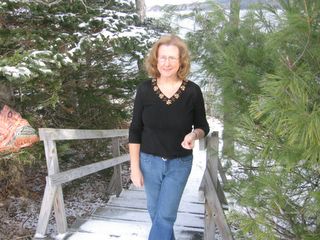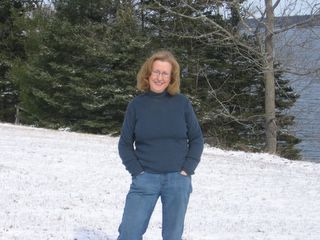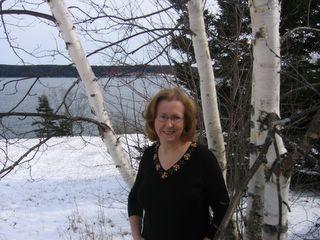Monday, February 27, 2006
Sunday, February 26, 2006
On poetic inspiration

But when Erato brushed her flowery lute, What strains of sweetness whispered in the wind! Soft as at evening when the shepherd's flute To tones of melting love alone resigned, Breathes through the windings of the silent vale; Complaining accents tremble on the gale, Or notes of ecstacy serenely roll. So when the smiling muse of Cupid sung, Her melody sighed out the sorrowing soul, Or o'er her silken chords sweet notes of gladness rung.
From an Ode to Music by James G. Percival
What sweet confluence of life drives the poet? Who knows. It seems, at best, an erratic Erato, at least for me. I do know that without inspiration, poetry simply does not happen, and that even with it, poetry is very hard work. For "Slice by Slice," my inspiration arose from a situation that brought both exquisite joy and excrutiating frustration to me. Perhaps it was the bringing together of those extremes of emotion that opened the creative floodgates. It did have a definite feeling of something long locked now released. In addition, I am fortunate enough to live in an old summer cottage overlooking the sea. The natural beauty of the area provides imagery on a minute-by-minute, day-after-day basis. But imagery alone does not create poetry. For me the process begins in emotion, and then I seek a likely image from the natural world to express that emotion. In this case, it was the moon. For days, I had watched it grow from the merest of slivers until it had transformed itself into a huge, almost peach-colored orb. When it was full, its path extended from just over the tree line above Long Island in Blue Hill Bay to my front porch. It was a spectacular sight, and it felt every bit the gift that the emotions did to me. And out of them, came "Slice by Slice."
Slice by Slice
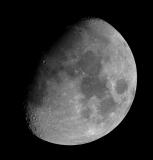
Each night
as I walk the curving drive to my house,
I watch the moon grow,
slice by slice,
until it is heavy
and burgeoning over Long Island.
Pregnant with light,
and tinged with a blush of hope
bordering on vulnerability,
it lays a swath
of white light on water,
a path through gently lapping waves,
across shards
of summer lupine stems,
and through rustling hydrangeas
to my front porch.
I perch on the top step,
wrap my arms around my knees
and lean against a railing
whitewashed by moonlight,
waiting in silence
for deliverance
as my heart grows fuller,
slice by slice.
About sea urchins
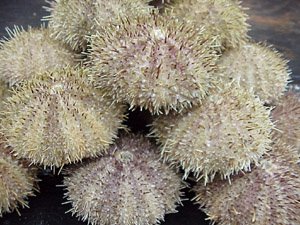
Several summers ago, my children and I spent the better part of one week of our sailing vacation in Penobscot Bay searching offshore islands for sea urchin shells. The sea urchin, for those of you who have not had the pleasure of chancing upon one, is a round, purple spiny sea creature that lives abundantly in Maine's subtidal zone. It loves our rocky bottoms and is harvested by scuba divers in depths of 20 to 80 feet. Divers pick the urchins off the bottom and place them in mesh bags, which the boat operators waiting above haul up and empty into a bin. The largest market for sea urchins is to be found in Japan, where diners love the delicacy of the roe.
Our harvest, however, was more esthetically driven. When a sea urchin dies, it empties from the inside out, and its spiny exterior is stripped bare by the motion of the sea, leaving behind a stunningly beautiful, pale green shell. The shell is marked by groups of raised beads, separated into sections by lines that radiate out from a tiny hole in the center. Sea urchins are extremely fragile and must be handled very gingerly or they will crumble into pieces.
That summer, we dutifully picked these shells up from our island stops: Pond, Hog, Green, Long, McCafferty, Hell's Half Acre, Butter, Pickering, Eagle, Barred, and Great Spruce Head, to name a few. We strolled the beaches, picking up these treasures, placing them ever so carefully in buckets in the hold of our boat. By week's end, we had upwards of 20 or so, and I took them home, soaked them in a mixture of Chlorox and water to remove any remaining smell from the decomposing process, and stored them carefully in a glass jar for all to see.
They represent, for me, the incandescent joy of those peaceful days on the coast of Maine. My oldest child, a daughter, was just 18 months when we first started sailing. We tucked her into a portable crib in the forward V-berth, where she would fall asleep to the gentle rocking of the waves. She took some of her first steps on island beaches, and she and her two younger brothers, who joined our crew from birth, grew up among lobster pots and bell buoys. They cheered at the sight of island promontories covered with harbor seals and dolphin pairs arcing past our boat. Their night sky was ablaze with stars and their breakfast companions the ever-patient sea gull floating close by, hoping for left overs. They learned to identify the sharp keening of an osprey and the white head of an eagle. Their first experience behind a motor was in our dinghy with its 5 hp engine that gave them just enough speed, as they spun in circles around boats in the harbor, to feel exciting, especially at five years of age.
The sea urchin in this poem represents all of that joy, but it is a joy juxtaposed with an ever-present realization that if not carefully tended, any joy is fragile. The five radiating sections of the sea urchin coincide with the size of my family at the time. Each section was equally vulnerable to harm, equally beautiful in its simple existence. The poem attempts to capture both the beauty and the vulnerabilty of this family group.
The Sea Urchin
He reaches,
with hands heavy as cast iron,
and lifts the empty sea urchin
from my cobalt blue jar.
Its absence is noticeable
among the remaining shells.
Once,
in the sub tidal zones
of Maine’s coastal waters,
it clung with stubborn tube feet
to rocky ledges,
inching its way past
sea cucumbers
and waving anemones.
Strongylocentrotus droebachiensis
Harvested by divers
line-tended to surface skiffs,
its gonads are processed
into shio, mushi, yaki or reito uni
for picky Japanese customers.
Now,
empty of roe,
its protective spikes stripped away
by the rhythm of the sea,
it bears the weight of his thumb
as, idly, he rubs its fragile surface
back and forth.
I watch,
nervous,
eyeing the sphere
and its radiating rows
of sun-bleached beads,
wondering which of the five
perfectly
symmetrical
sections
will be the first to crack.
When I let go my breath
And ask for the urchin,
he nods—
nonchalantly,
and hands it over.
with hands heavy as cast iron,
and lifts the empty sea urchin
from my cobalt blue jar.
Its absence is noticeable
among the remaining shells.
Once,
in the sub tidal zones
of Maine’s coastal waters,
it clung with stubborn tube feet
to rocky ledges,
inching its way past
sea cucumbers
and waving anemones.
Strongylocentrotus droebachiensis
Harvested by divers
line-tended to surface skiffs,
its gonads are processed
into shio, mushi, yaki or reito uni
for picky Japanese customers.
Now,
empty of roe,
its protective spikes stripped away
by the rhythm of the sea,
it bears the weight of his thumb
as, idly, he rubs its fragile surface
back and forth.
I watch,
nervous,
eyeing the sphere
and its radiating rows
of sun-bleached beads,
wondering which of the five
perfectly
symmetrical
sections
will be the first to crack.
When I let go my breath
And ask for the urchin,
he nods—
nonchalantly,
and hands it over.
Saturday, February 25, 2006
On creating poetry in cars
Of late, I've taken to writing poetry in my car. While driving. For those of you who would seek to avoid me while in this process, it's a cornflower blue VW Jetta, and it regularly cruises Rte. 15 between Orono and Blue Hill, Maine. I'm not sure why I've begun doing this, other than the fact that I spend an inordinate amount of time driving each day and have found that if I don't write my snippets of inspiration down immediately, I tend to lose them. It also makes the trip a bit less tiresome. You can only admire so many blueberry barrens and idyllic streams in the Maine woods for so long...
Anyway, sometimes, a thought comes to me from that very scenery--like a recent morning when I watched the moon set in a lilac sky as the sun rose behind me in a blaze of yellow heat. Or the week of nights when the full moon seemed to be chasing me home. Or the spectacular way the full moon formed a spotlight directly down upon huge diamonds of ice as I crossed the Reversing Falls Bridge in Blue Hill. Or the morning when a rime of frost created a monochromatic landscape and when the river heaved itself up in huge slabs of ice that called to mind Civil War tombstones askew. A beautiful red fox darts across the road in Prospect, his bushy red tail streaming out behind him, and I am thrilled by the astonishing site of a coyote frozen in my headlights in a field by the South Blue Hill Community Center. Eiders huddle together against the current of the Reversing Falls. A flock of fifty or more seagulls rises up in panic and breaks into two equal groups of beating wings at the too eager approach of my boxer. And on, and on...
Just to see each of these is a gift. When I can capture them on the back of a bank envelope or a napkin from MacDonald's (I know--a terrible habit), the gift multiplies because sooner or later it finds its way into my poetry.
Today's poem (see previous entry), "Carbon Dreams," was a car poem, as was yesterday's entry, "Slice by Slice." They both came upon me enroute to Blue Hill, and though the "final" version (when is a poem ever final?) often takes an evolving shape from that baptismal moment, there is something very exciting about the way they burst onto my scene.
Now, if I could just figure out how to get the laundry done while locomoting, my life would be perfect...
Anyway, sometimes, a thought comes to me from that very scenery--like a recent morning when I watched the moon set in a lilac sky as the sun rose behind me in a blaze of yellow heat. Or the week of nights when the full moon seemed to be chasing me home. Or the spectacular way the full moon formed a spotlight directly down upon huge diamonds of ice as I crossed the Reversing Falls Bridge in Blue Hill. Or the morning when a rime of frost created a monochromatic landscape and when the river heaved itself up in huge slabs of ice that called to mind Civil War tombstones askew. A beautiful red fox darts across the road in Prospect, his bushy red tail streaming out behind him, and I am thrilled by the astonishing site of a coyote frozen in my headlights in a field by the South Blue Hill Community Center. Eiders huddle together against the current of the Reversing Falls. A flock of fifty or more seagulls rises up in panic and breaks into two equal groups of beating wings at the too eager approach of my boxer. And on, and on...
Just to see each of these is a gift. When I can capture them on the back of a bank envelope or a napkin from MacDonald's (I know--a terrible habit), the gift multiplies because sooner or later it finds its way into my poetry.
Today's poem (see previous entry), "Carbon Dreams," was a car poem, as was yesterday's entry, "Slice by Slice." They both came upon me enroute to Blue Hill, and though the "final" version (when is a poem ever final?) often takes an evolving shape from that baptismal moment, there is something very exciting about the way they burst onto my scene.
Now, if I could just figure out how to get the laundry done while locomoting, my life would be perfect...
Carbon Dreams
The moon is milky white tonight.
It pours its light onto an inky black sky
and makes an almost day out of night.
I lean into the darkness,
straining for the one sound
that will break the silence.
Today, the farmer on Rte. 15
burned his blueberry field.
The black stubble he left behind
seems out of place
in that February landscape
and I wonder,
Why now?
What natural good
comes from carbon in winter?
Elsewhere,
a body waits
in an interrupted rhythm
of movement
and fluid motion,
of soft glances
and lips that smile and release,
of friction withheld
building heat
buying time.
There, too,
a harvest lies waiting,
dormant, but hopeful—
Carbon dreams.
It pours its light onto an inky black sky
and makes an almost day out of night.
I lean into the darkness,
straining for the one sound
that will break the silence.
Today, the farmer on Rte. 15
burned his blueberry field.
The black stubble he left behind
seems out of place
in that February landscape
and I wonder,
Why now?
What natural good
comes from carbon in winter?
Elsewhere,
a body waits
in an interrupted rhythm
of movement
and fluid motion,
of soft glances
and lips that smile and release,
of friction withheld
building heat
buying time.
There, too,
a harvest lies waiting,
dormant, but hopeful—
Carbon dreams.


